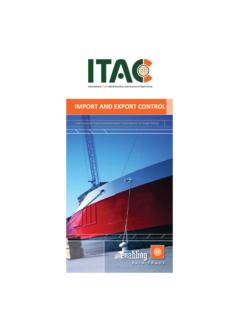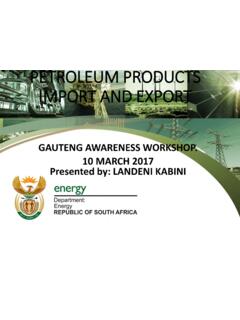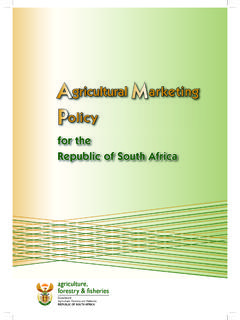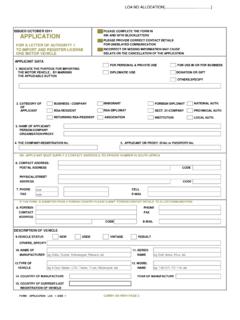Transcription of The South African metal recycling industry in focus
1 Date: 12 May 2017 Tutwa Consulting Group The South African metal recycling industry in focus Globally the scrap metals industry is responsible for the recovery and processing of metals no longer in use. recycling of metals is critical to society as it has large environmental, economic and sustainability benefits. 2 Table of Contents The South African metal recycling industry in 1 1 Introduction .. 3 2 What metals are scrapped .. 3 Nonferrous metals .. 3 Ferrous Metals .. 3 3 Sources of waste and scrap metals .. 3 4 Regulation of the scrap and recycled metal trade .. 4 5 How does the metals recycling industry add value to the economy? .. 5 6 International trade of scrap and recycled metals and the crisis of the local primary metals fabrication industry .
2 6 Table of Figures Figure 1: Share of global recycled metal exports, 2014-2016, Volume and Value .. 6 Figure 2: Global scrap metal import composition, 2013-2015, millions of tonnes .. 7 Figure 3: Global aggregate scrap and recycled metal imports by source, 2010-2015, millions of tonnes .. 8 Figure 4: Seasonally adjusted indices of physical volume production, 2007-2016 .. 9 Figure 5: Actual indices physical volume of mining production, 2011-2016 .. 9 Figure 6: South African exports of select metal ores, 2010-2016, tonnes .. 10 Figure 7: Top 5 South African export destinations for metal ores, 2011-2016, millions of tonnes .. 11 Figure 8: South African Scrap Metals Value Chain Diagram.
3 12 3 1 Introduction Metals, as non-renewable resources, are expensive to extract and even more costly to process. However, after ores have been extracted and processed, the resultant metal product can be recycled for reuse at much lower costs than raw, virgin ores. Since less energy is used there is a major environmental bonus. Therefore, a well-functioning domestic metals recycling industry is a cost effective, environmentally friendly component of the metals and downstream production value chains. More information on the role and function of the scrap metals industry in the broader metals value chain can be found in the value chain diagram.
4 2 What metals are scrapped The annexed value chain diagram (Figure 8) gives a broad understanding of the role and position of the metals recycling industry in the metals value chain, however this is a very high-level generic picture. In reality, the metals recycling industry is as diverse and complicated as the products used for recycling . The Institute of Scrap recycling Industries (ISRI), a global recycling industry representative, catalogues and classifies the various recycled metal types with standard specifications in order to regulate the trading of materials and products. Their latest Scrap Specifications Circular catalogues 158 different nonferrous recycled metal classifications and 125 different ferrous recycled metal classifications.
5 Nonferrous metals1 Nonferrous metals comprise base metals or alloys thereof. In SA and globally nonferrous recycled metals account for less than 10% of the total recycled metal volume in circulation and on average, nonferrous recycled metal unit value is 10 times that of ferrous. Ferrous Metals2 Ferrous metals are iron / steel based products and constitute more than 90% of recycled metal volumes generated in South Africa, and globally. However, they are relatively low value in comparison with nonferrous metals. 3 Sources of waste and scrap metals Waste and scrap metals, the products used as inputs for metal recycling , can be divided into two broad categories.
6 The first, production scrap, is a result of waste and scrap metals generated during the production / manufacturing of metal products. This type of scrap metal can be found in the manufacturing sector in the form of turnings / shavings, off-cuts, trimmings and stampings. Additionally, foundries, mini-mills and mills generate home scrap from their melting processes and this is usually reused or recycled in-house, without being sold to the recycling sector. Production 1 Includes scrap and waste of Aluminium, Copper, Brass and Bronze, Zinc, Lead, Magnesium, Tin, Cadmium, Antimony, Tantalum, Manganese, Germanium, Vanadium, Gallium, Indium, Niobium/Columbium, Zirconium/Hafnium, Molybdenum.
7 2 Includes scrap and waste of carbon / mild steel, Cast iron, Stainless steel, tinned iron or steel, iron and steel turnings, shavings, chips, milling waste, dust, filings, trimmings and stampings. 4 scrap is usually sold to Recyclers where the scrap metals will be processed and grouped according to their ISRI classification. The second category, obsolete scrap, refers to metal products that have reached the end of their life span or utility. This includes a wide range of metal products and products containing metal . It is predominantly collected by Dealers or Recyclers who process them to a commoditised raw material. Whilst some recyclers specialize, most will target both ferrous and non-ferrous metal products.
8 metal recyclers collect the obsolete scrap metals, working with a network of collectors3 to source scrap metals from its economically viable catchment area , and collect industrial scrap from the demolition and scrapping of buildings, rail and electrical infrastructure, and transportation equipment. 4 Regulation of the scrap and recycled metal trade The purchase and sale of scrap metals in South Africa is regulated, inter alia, by the Second-Hand Goods act of 2009 (SHGA), under the purview of the South African Police Service (SAPS). The act regulates the business of dealers in second-hand goods and pawnbrokers, in order to combat trade in stolen goods; to promote ethical standards in the second-hand goods trade; and to provide for matters connected therewith.
9 It requires that every person who carries on a business as a buyer or seller of scrap metal be certified on an ongoing basis. Similarly, Second-Hand Goods Dealers' Associations must be registered with SAPS in terms of the Second Hand Goods Act as an Accredited Association to establish and maintain minimum legal and ethical standards with regard to their members4 - and to maintain a database of their members - and association visits to members, as well as make such information available to SAPS upon request. The metal recycling Association of South Africa (MRA), established in 1942, is a SAPS accredited association. As such it regulates and enforces members in terms of general conduct and SHGA compliance.
10 MRA members comprise the majority, in terms of volume, of the country s formal metal recycling sector, with current membership of approximately 100 companies with 250 production yards. Controlled goods The SHGA refers to nonferrous metals5 as controlled goods , which as the name suggests are subject to stringent levels of control. The trade of stolen items in the metals recycling value chain, especially controlled goods, remains a source of concern for legitimate metal recyclers globally. Compliant recyclers see the theft and purchase of these goods as a blight that erodes trust in the industry and in their companies, and can result in stricter regulation of scrap metals and recycled 3 Scrap metal collectors include a large number of informal labourers -in several studies estimated to be as high as 400 000 people- bakkie collectors and bucket shops.




